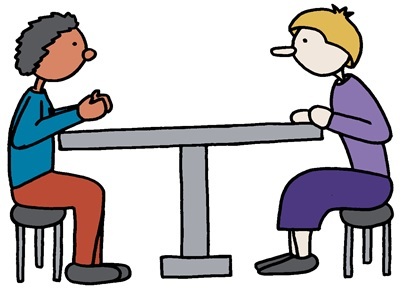During my travels around the globe, I've noticed that the one-on-one, a regularly scheduled private dialogue between a manager and an employee, is possibly the most widely supported management practice in the world. It is usually promoted as a good way for managers to get to know their employees and to help employees perform better and develop themselves [Haneberg, "How to Have Great One-on-Ones"; Rothman and Derby, Behind Closed Doors]. Based on what can be gleaned from standard management literature, the purpose of the one-on-one is for a manager to discuss four things:
- Status and progress
- Obstacles and problems
- Career development
- Coaching and feedback
Interestingly enough, despite the fact that many managers agree on the usefulness of one-on-ones, few of them actually organize these regular private meetings because managers feel the meetings distract them from their "real" work. [McCarthy, "How to Have an Effective 1 on 1"] I'm sure there are some who keep saying that "if only they could find the time" they would certainly schedule one-on-ones with their employees. And they spend five years trying to find that time.
A Good One-On-One
I found some useful requirements for good one-on-one meetings. [Derby, "One-on-Ones with Self-organizing Teams"] First of all, it is said that, one-on-ones should follow a clear schedule. Some authors say weekly, others say monthly, and the rest of the authors can be plotted anywhere in between. I'd say anything between one and four weeks would be fine, depending on the context. Second, the meetings should be adapted to the employee's needs. There's no fixed agenda for one-on-ones, and the specific topics depend on the people. [Artner, "One-on-ones: Useful tool or waste of time?"] Third, the meeting should have the two participants' full attention. No phone calls, no checking of e-mails or Facebook, and no watering of the plants during the one-on-one. Fourth, an important requirement for one-on-ones is they shouldn't give anyone the feeling that the one-on-ones are costing them too much time. In many organizations, not doing them would be much worse. [Rothman, "No More Meeting Mutinies"]
Manage The System, Not The People
This could make you wonder about the difference between personal coaching and one-on-ones. Personal coaching is about a coach helping people do better work and develop themselves and one-on-ones are about a manager helping employees do better work and develop themselves. Does that mean the manager is the employee's personal coach?
No.
Remember that trust needs to be at the core of a personal coaching relationship. A person must be able to share any fears, uncertainties, desires, and ambitions with her personal coach. For many people this will be very difficult to do when the other person is their direct manager. How would you tell your manager that you fear he might discover the freelance gig you have on the side? How would you tell your manager that your greatest desire is to have her job? Transparency is a noble goal, but in many organizational cultures, it's a bridge too far. Coaching might be necessary to precede and grow transparency.
I agree with those who say that managers are responsible for making personal coaches available to their employees, but they should not aim to fulfill this role themselves. I am against the idea of "managers as coaches". My first argument is that managers should manage the system, not the people. Therefore, personal coaching is not a primary task in the manager's role. [Appelo, Management 3.0 loc:4754] Management's responsibility is the coaching capability of the system, not the day-to-day implementation of it. My second argument is that, when the role of the manager is mixed up with the role of the coach, the other employees will also expect to be coached in their one-on-one meetings with their managers. This goes against the idea that anyone in an organization should be able to act as another person's coach. My third argument, closely related, is that it strengthens the hierarchy when managers in an organization act as people's coaches. [Appelo, "Managers Should Not Be Coaching Developers"] It reinforces the misguided idea that superiors are more experienced than their subordinates are. In the 21st century, we shouldn't reinforce hierarchies. We should aim for self-catalyzing networks.
This does not mean that managers have no business talking with their employees. Of course they do. But the focus of their conversations should be on the value offered by the person to the system, and the value offered by the system to the person. This value exchange can be boosted considerably by making sure that every person is offered personal coaching. When a manager also wants to play the role of a personal coach, it would be wise of him not to offer this service to his own direct reports, but to employees elsewhere in the organization. That's how you can grow a network, instead of a hierarchy.
Jurgen Appelo is Europe's most popular leadership author, listed on Inc.com's Top 50 Management Experts and 100 Great Leadership Speakers. His latest book Management 3.0 #Workout, full of concrete games, tools, and practices, is available as a FREE pdf, and in paperback, Kindle and ePub versions. Get your copy here.

